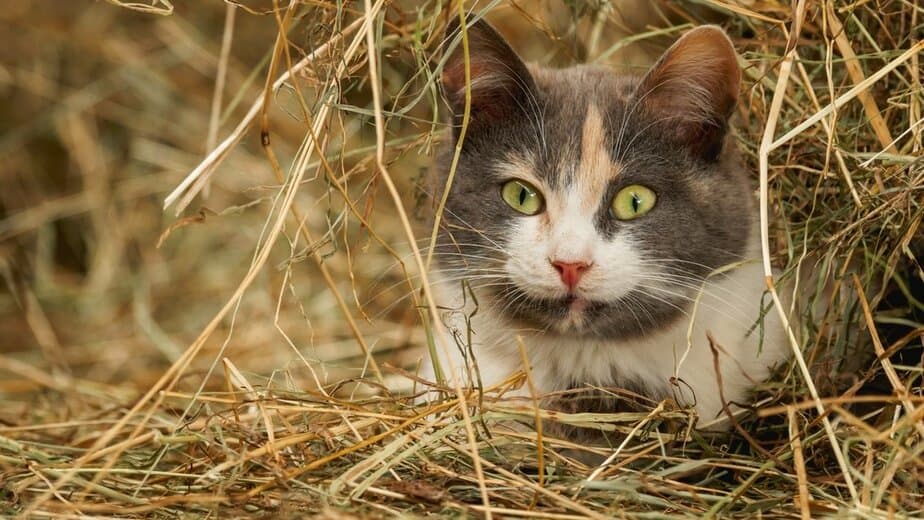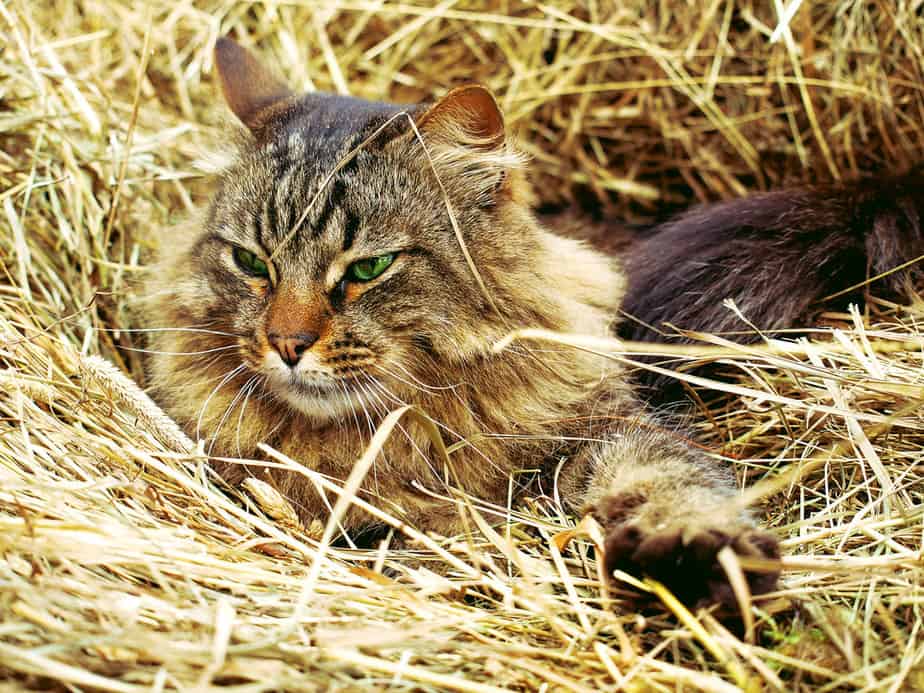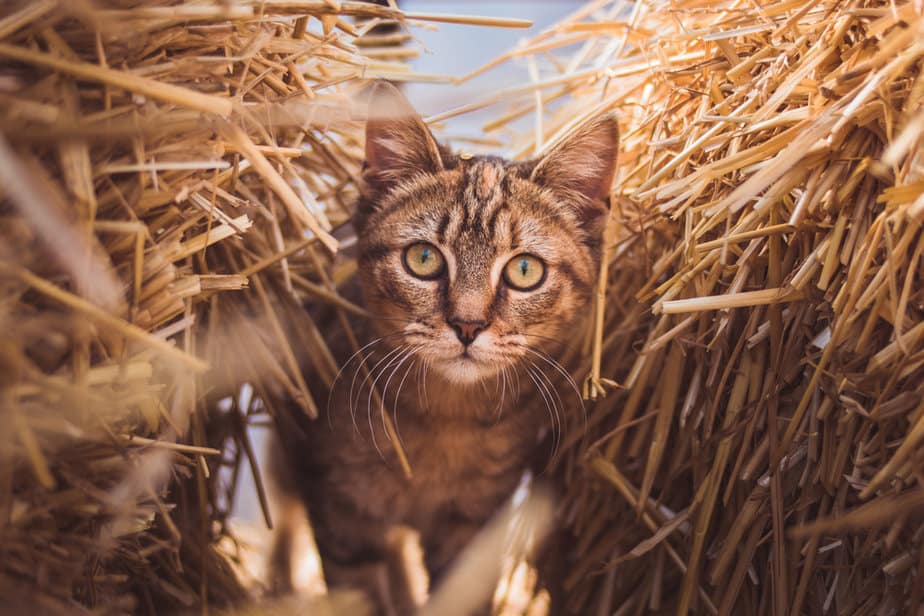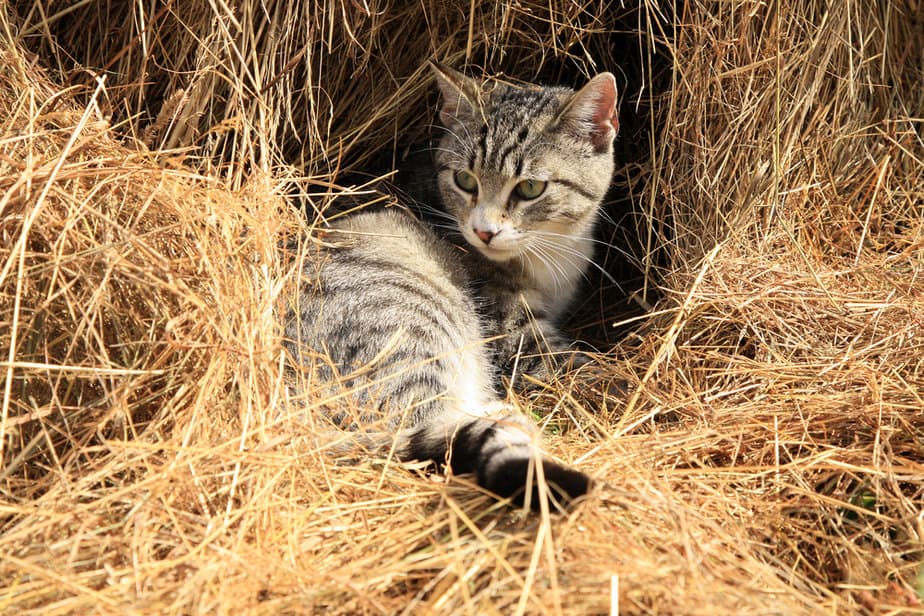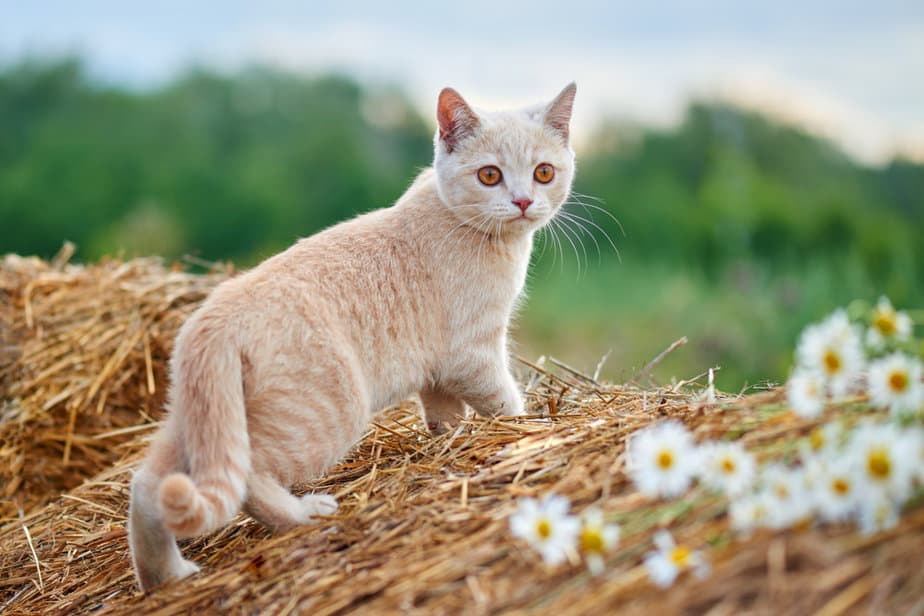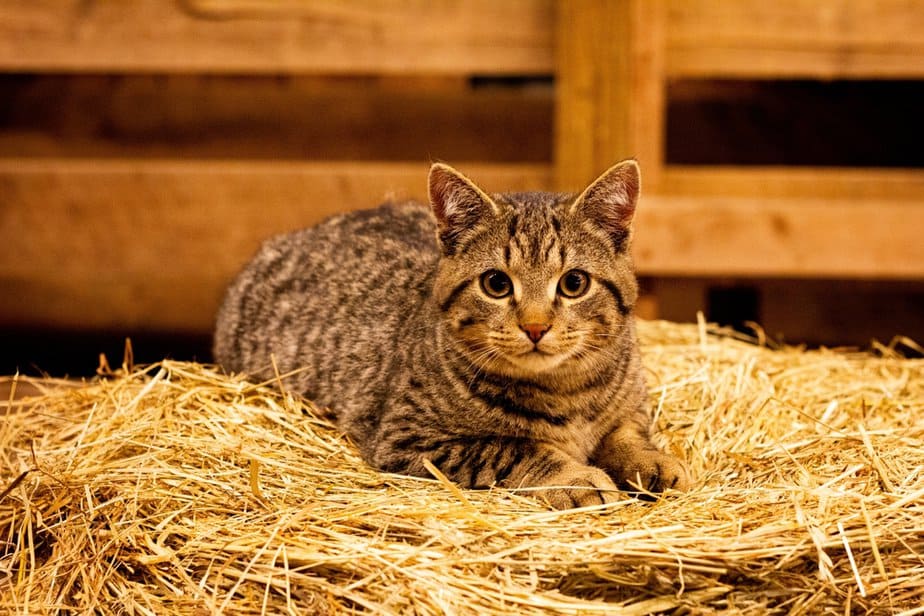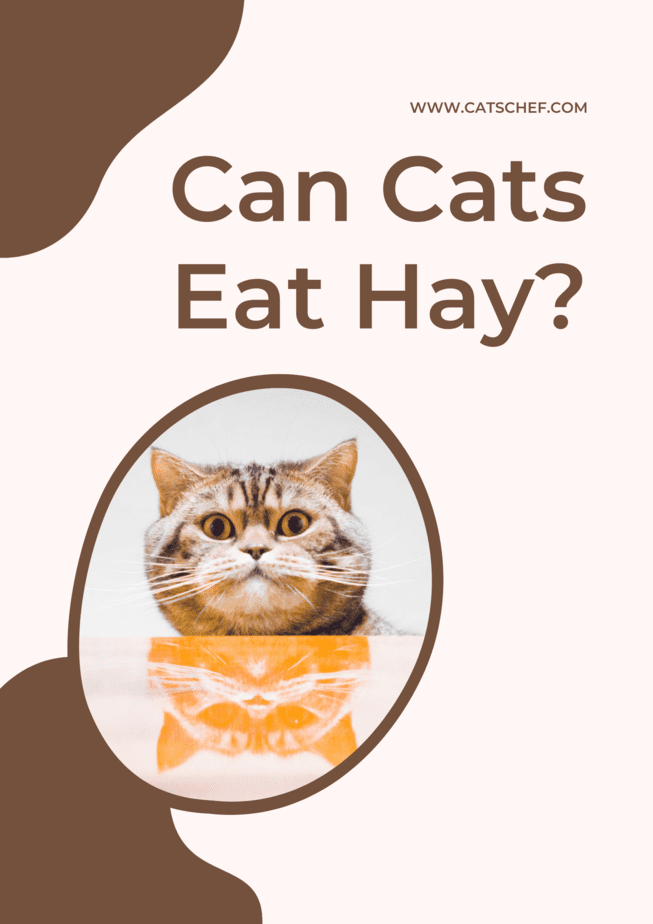📖 Table of Content:
“Can cats eat hay?” You never thought you would have to hop online to check whether your four-legged friend has a reason to visit the emergency animal center after munching on some Timothy hay in your backyard. But, here you are and you’re looking for some answers.
Who would’ve thought your cat’s behavior would confuse you to the point where you’re questioning her sanity? “Come on, munching on hay after scoffing down an entire bowl of kibble? Who does that?!”, you yell while she’s meowing and purring for forgiveness.
You’re not the only one, trust me. Pet parents are responsible for their pet’s health, and there are times when they’re faced with difficult decisions. There are times when cat foods and cat treats don’t hit the spot anymore, and they’re responsible for picking the next best things.
And yes, there are times when the next best thing seems doesn’t make sense. Sure, you’ve seen your furry friend nibble on fresh grass (even cat grass!), but never on hay. You‘re pretty sure hay doesn’t seem like something that would be purrfect for a purrincess.
But, here we are and we’re ready to give you the answers you’re looking for. According to our friends over at the ASPCA (American Society for the Prevention of Cruelty to Animals), cats can eat hay FROM TIME TO TIME. Cats can’t (or at least shouldn’t) eat hay as a regular part of their diet.
Let’s just say there are a couple of things to consider before you take your feline friend to the nearest farm and let her go ham on some hay. Here’s everything you need to know before you make up your mind.
Can cats eat hay?
You know that feeling when you see your furry friend munching on something but you have no idea what that something could be? That has to be one of the worst feelings a cat owner can feel and one we don’t wish on our worst enemies.
So, look at this from the bright side. You know your cat’s been munching on hay while you were too busy rewatching Friends for the millionth time. You know she’s been doing pretty great after the incident and you know it’s probably nothing to worry about.
You’re right, cats can eat hay from time to time with no repercussions. Hay doesn’t contain anything that could harm your cat’s health, but it does contain a bunch of nutritional and health benefits for MOST animals.
We put the emphasis on most because, while we don’t consider hay toxic, hay shouldn’t be a part of your cat’s diet. Hay doesn’t offer much nutritional value to your cat (apart from a little bit of fiber and rumored hairball relief) but does offer digestive problems and a sudden rush to the litterbox.
Don’t get me wrong, chewing on a couple of hay strands shouldn’t send your cat to the emergency animal center. However, there are no good reasons for your cat to scoff down large amounts of hay on a regular. No nutritional benefits, no health benefits, nothing (other than a smile on her face!?).
What to consider when feeding hay to your cat?
We’re not saying that you would ever ACTUALLY feed your cat hay instead of her regular food, but… She might be giving you those looks, petting you with her paws, and purring your ears off until you give up and let her have her way with hay.
Cats love eating fresh grass, so who’s to say your cat doesn’t LOVE eating hay whenever she needs a pick-me-up? Trust me, you might be tempted to let her do whatever she wants, but there’s a reason why pet stores don’t have hay for cats.
Here’s what you need to keep an eye out for when you’re dealing with a four-legged friend that has a hay fever (not a real fever, more like an obsession).
1. Fiber
Oh, fiber! Who wouldn’t love something that regulates your digestive system, offers a helping hand when you’re dealing with constipation and diarrhea, and makes you poop better? Yes, small animals, big animals, and every other animal that munches on hay reap these benefits.
Hay’s packed with fiber, and fiber provides bulk to help food move through your cat‘s digestive tract. Not only that, but fiber also absorbs water and regulates your cat’s poops which can help with constipation and diarrhea. So yes, fiber’s a pretty important friend to your cat’s digestive system.
However, that doesn’t mean that your cat should consume a bunch of fiber on a regular basis. And, that also doesn‘t mean that the source of fiber doesn‘t matter. Your cat can get fiber from other (maybe even better) sources such as fresh grass, pumpkin, squash, sprouts, and blueberries.
Basically, you shouldn’t turn to hay the moment your cat starts showing symptoms of digestive upset. Consult with your vet to find the best source of nutrients for your furry friend, and stick with your regular cat food and cat treats for most of her diet.
2. Hairball hack
Yes, that’s right. Supposedly, munching on hay every now and then can help your furry friend deal with hairballs. The fiber that’s in hay helps her digestive system break down and process everything that’s inside, including those pesky passengers.
What even are hairballs? Hairballs might sound like the most disgusting thing ever, but they’re actually a result of your cat’s grooming routine. Your cat uses her tongue and teeth to brush her hair, clean herself, and get rid of anything she doesn’t want to walk around with.
While most of the hair she accidentally eats goes through her digestive tract and comes out at the other end, some of the hair gets left behind and forms a hairball. Hairballs can be extremely uncomfortable, unpleasant, and even dangerous for your cat.
They can cause blockages, become a choking hazard, and even send your cat to the emergency animal center. To your cat’s disappointment, some hairballs require medical attention because they can become life-threatening.
Who would’ve thought that cats can benefit from eating hay?! But yes, cats can eat hay when they’re having a hard time hacking, gagging, and retching to get rid of those hairballs. Don’t forget to consult with your vet beforehand, though.
3. Digestive problems
And yes, we’re still talking about fiber! Sure, the fiber that’s in hay can offer a couple of nutritional and health benefits to your cat. But, fiber can also cause some health complications when consumed over a longer period.
What do we mean by that? On one hand, the fiber in hay can cause an upset stomach, vomiting, and diarrhea. Fiber’s typically the good guy in everyone’s story but there are instances where too much fiber can cause digestive distress.
On the other hand, cats are carnivores which means they don’t need hay as a regular part of their diet. Cats don’t possess the enzymes necessary to break down and process a lot of the foods that humans and other animals eat, and hay doesn’t seem to be an exception.
And, cats can even have an allergic reaction to hay. Some of the most common symptoms are irritations on the skin, loss of hair, loss of appetite, weakness, vomiting, and diarrhea. Consult with your vet THE VERY MOMENT that you notice any of these symptoms.
4. Nutritional value
Hay’s got some pretty great nutritional benefits for MOST animals. It’s packed with fiber, protein, and calcium (alongside some other vitamins and minerals). It’s great for maintaining the health of the digestive system, promoting salivation and rumination, and ensuring proper air circulation.
Timothy hay and Alfalfa hay (apparently) carry the most nutritional value out of the bunch. These two types of hay are legumes hay rather than grass hay, which seems to set them apart from the rest.
Hay’s great for MOST animals because of numerous reasons, but it’s not as great for cats. While hay isn’t toxic to cats (or anything of the sort), this tasty treat doesn’t carry any nutritional value for cats (apart from the above-discussed fiber).
Cats require a specific diet that’s comprised of meat, animal protein, and animal nutrients. They get most of what they need from cat food, cat treats, and just straight-up meat treats. They can eat chicken, turkey, beef, and fish but they can’t really eat hay.
Well, they can, but that doesn’t mean that they should. They can have AN OCCASIONAL hay strand when they’re looking to chew on something, and even that’s more than what they need. Make sure your cat doesn‘t go overboard on hay, and (you guessed it) consult with your vet.
Can cats eat hay? What to do when you catch your cat eating hay?
Nothing?! Don’t worry, we understand that this talk about stomachaches and emergency vet visits doesn’t sit well with your worried mind. But, you don’t really have to do anything when you catch your four-legged friend munching on a basket of hay.
Hay doesn’t contain anything that can harm your cat THE MOMENT she nibbles on a couple of strands. Hay can harm your cat only when she goes overboard (in one sitting), or when she doesn’t eat anything other than hay for a longer period.
Other than that, you can always consult with your vet to ease your mind. You can check whether your furry friend has a sensitive stomach that wouldn’t be able to digest a little bit of hay. Or check whether she has an allergy you haven‘t been aware of.
Trust me, there’s hardly anything dangerous about munching on hay that should keep you up at night. She knows what she’s doing, especially when she keeps coming back for more. She wouldn’t do that on the off chance that hay’s making her sick, now would she?
How to stop your cat from eating hay?
“But, my cat DOES have a sensitive stomach and she SHOULDN’T eat hay. What now?!” Don’t worry, there are a couple of things you could do to prevent your cat from munching on hay while you’re busy doing something else (you know, you can watch Friends while she’s sleeping?).
First things first, keep your cat away from the hay. The two of you might be living on a farm where you’re surrounded by hay everywhere you go, and that’s completely fine. But, you can try keeping the hay somewhere your cat can’t reach or can’t explore.
On the other hand, you can distract your cat whenever she‘s getting ready to attack a stack of hay. You can play with her favorite toys, cuddle, or even offer her a different treat that’s WAY MORE delicious than hay. Trust me, these tricks work like a charm.
What’s better than eating hay for your cat?
Here’s the thing, fruits, veggies, and plants aren’t really a cat’s cup of tea. Cats are obligate carnivores which means they require a bunch of meat, animal protein, and animal nutrients in their diets to survive and thrive.
They don’t require fruits, veggies, and grains the same way humans do. And they don’t possess the enzymes necessary for their digestive systems to break down and process most foods humans eat regularly. They’re pretty much bound to spend their lives on a Keto diet.
So, what’s better than eating hay for your cat? Sure, cats should eat cat food and cat treats for most of their lives, but they can have occasional snacks (or cheat meals) that aren’t a natural part of their diet.
We’re talking about minuscule morsels of chicken, turkey, beef, fish, and even pork (pretty fatty but fine when consumed moderately). We’re also talking about carrots, cucumbers, zucchinis, blueberries, and a bunch of other fruits and veggies that are SAFE for your cat.
What’s the conclusion? Can cats eat hay?
Cats can eat hay FROM TIME TO TIME. Hay doesn’t have much to offer to your cat in terms of nutritional and health benefits, but your cat doesn‘t seem to mind that. She wants to have an odd-looking and odd-tasting treat, and that’s completely fine.
She can have some hay whenever she’s in the mood for a pick-me-up, but she shouldn’t munch on hay every single day.
Read more: Can Cats Eat Arugula? Not Your Regular Snack, But…
